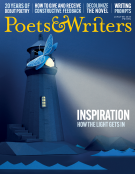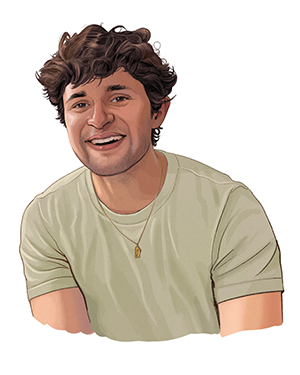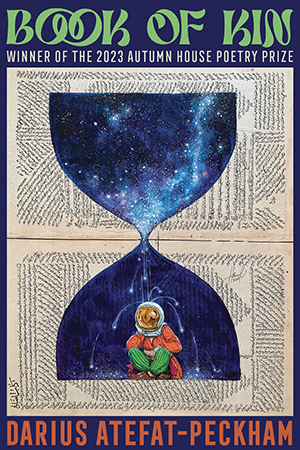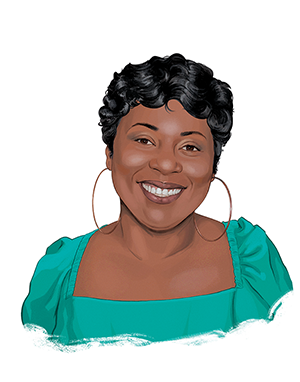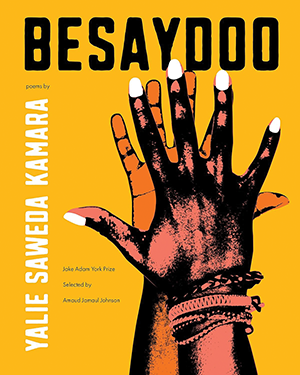Darius Atefat-Peckham
Book of Kin
Autumn House Press
(Autumn House Poetry Prize)
I have learned this much: the lake
is a mother. I am feathered, buoyant in
its swell.
—from “Mother”
How it began: The poems in Book of Kin are both love poem and elegy, always beginning, like a ghazal, with an implicit address: to my beloveds, the universe, the self. Always in search of deeper connection. As Mark Doty writes in the memoir Dog Years (Harper, 2007), the book that began my writing journey: “Love, I think, is a gateway to the world, not an escape from it.” Book of Kin began as an attempt to commune with my late mother and brother in a poetic space, to understand and complicate what it means to be a “survivor” of tragedy, to catalogue the experience of grief and how it informs my coming of age. As I constructed a language for my grief in the writing of this book, it became apparent that I was really constructing a portal to the way I love and am loved, the love that grief is and can be, the hope and abundance implicit in the acts of remembrance, reconstitution, and continuance of voice—or, the act of writing poetry.
Inspiration: My biggest source of inspiration is my family. I like to think the title of my book is fairly literal; I’ve been surrounded by beautifully sincere, selfless, and loving people my entire life, people who have set an example of care for me to follow. My dad, my stepmom (who I call Rachie), and my birth mother are all stunning writers and writing mentors and, most importantly, kind and brilliant souls. I’ve also noticed that many of my loved ones have this incredible and awe-inspiring ability to transcend their roles. My grandparents are often more like parents; my cousins and many of my friends are like siblings to me. Early loss has taught me to live with an abundant and expansive idea of family, or kin. My poems, first and foremost, are of and from and for my family.
Influences: I’m lucky to have the words of four artists I greatly admire gracing the back of my book: Mark Doty, Naomi Shihab Nye, January Gill O’Neil, and my undergraduate mentor Tracy K. Smith, who worked with me on this manuscript and is one of the most discerning and inspiring instructors I’ve had the pleasure of learning from. Tracy taught me that poetry is an exercise in “making our lives more legible to ourselves,” and her book Life on Mars (Graywolf Press, 2011) was one of the first poetry collections I loved growing up. A few other writers I love dearly are Ross Gay, Sharon Olds, Kaveh Akbar, and Jorie Graham, another luminary mentor and guide without whom many of these poems wouldn’t exist.
Writer’s block remedy: Lately I’ve been trying to frame those periods of quiet as necessary time away, as rest, or as time out in the world. One of my early writing mentors, Michael Delp, would remind me, “Live first, write second.” It helped me understand that I am not my writing, not entirely, so my life doesn’t stop when my writing does. I took that advice to heart and often find myself writing my best when I truly feel like I’m living my life fully off the page and seeking beauty in a variety of ways. I guess another way of saying this is: Let life become your writing, rather than the other way around. I turn to the piano, pottery, the gym, getting out in nature, and talking to strangers, or a friend or family member who really knows (and believes in) me and my poetry.
Advice: Let yourself take risks, write and publish what excites you, even if it’s something you don’t fully understand. Submit yourself to the uncertainty and mystery of it all. My dad told me recently, “To live in hope is a beautiful thing.” Find a publisher who cares for your work and who can live in that uncertainty, risk, and hope alongside you. Sometimes I notice that my interview answers become catalogues of gratitude, so I’m sorry—though not too sorry—if that’s what’s happening here, but I feel so much gratitude to the folks at Autumn House Press, including Christine Stroud and Mike Good. I can’t recommend Autumn House enough for their hard work, discernment, and care.
Finding time to write: It’s so hard. I usually write best in the morning, so I try to keep a good sleep schedule (easier said than done) and write a bit before I start any other work or chores I may have for the day. If I need to write later in the day, I’ll often try switching up my surroundings—whether that means going to a busy pub with my computer, or sitting outside with my journal, or writing on my phone at the gym—so that I can feel like I’m having an experience out in the world, rather than being locked away from it. This way I can associate my writing with the beauty that surrounds me and feel more grounded in my body, and time doesn’t feel like such a finite resource—at least when it comes to my writing practice.
Putting the book together: I tried a few different iterations of Book of Kin, but ultimately my mentor Joanna Klink helped me settle on the final version over three hours together at the Flightpath Coffeehouse in Austin, in which all my poems were spread out on a few tables we pushed together, [ultimately creating the] three sections: “The First Sound,” “Book of Kin,” and “The Outer Reaches.” The way I envision it—who knows if the ordering is successful this way, or if others have had different reading experiences—“The First Sound” and “The Outer Reaches” sections are full of formally restless poems that leap at times into the metaphysical but ultimately find their logic in narrative and orbit the more dreamlike, imaginative, and formally ambitious long sequences in the book, which are housed in the “Book of Kin” section. As far as an emotional arc is concerned, I wanted the book to open out toward hope from its first line, “The first sound was the ax blade” to its last, “When I look, he cracks a smile.”
What’s next: I’m currently working on early drafts of poems that I hope will amount to my thesis for the Michener Center for Writers at the University of Texas in Austin, tentatively titled “Earth-Bound: Ghazals.” These poems either take the form of the ghazal, or broken ghazal, or are inspired by the themes and conventions of that form: love, grief, longing, distance, and hope for connection.
Age: 24.
Residence: I live in Austin but call Huntington, West Virginia (where I grew up and where my parents are), home.
Job: I’m currently pursuing my MFA in poetry and fiction at the Michener Center for Writers. I’m lucky to live comfortably off the program’s funding.
Time spent writing the book: Five years, if we’re going by the oldest poem in the book, “Imagine the Lake. Cyrus Is Alive,” which was written in Josh Bell’s poetry workshop for his love poem assignment my freshman year of college. But the cool thing about a debut collection is that I’ve been working on these poems as long as I’ve dreamed of being a writer, which is as long as I’ve been reading.
Time spent finding a home for it: About two years.
Recommendations for recent debut poetry collections: The Palace of Forty Pillars (Tin House) by Armen Davoudian, The Sky Was Once a Dark Blanket (University of Georgia Press) by Kinsale Drake, Slow Render (Airlie Press) by Jess Yuan, Terminal Maladies (Autumn House Press) by Okwudili Nebeolisa, and 2000 Blacks (University of Pittsburgh Press) by Ajibola Tolase.
Book of Kin by Darius Atefat-Peckham.
![]()
Yalie Saweda Kamara
Besaydoo
Milkweed Editions
(Jake Adam York Prize)
They glide slowly as they approach evening,
unaware that their kind is not meant to travel
alone, under the blueberry gauze of nightfall.
—from “Rekia and Oscar and All of Their Sky Cousins”
How it began: I wanted to write a book that examined, complicated, and dignified parts of the communities to which I belong. I am from Oakland and Sierra Leone, two places that are susceptible to stigma and whose inhabitants are often marginalized. While the dominant and largely negative narratives of my homes and their respective cultures were previously damaging, I am grateful to have learned how to resist and repurpose the biases—a gift I received from observing and communing with members from these communities or those with a similar profile. This skepticism and curiosity has led to the development of my sensitivity to the world around me and has inspired me to put pen to paper. I am devoted to the belief that the stories are where the loudest voices say there are none.
These geographies, Oakland and Sierra Leone, nest other parts of my identity that I wanted to document: being the daughter of bi-religious and bi-tribal immigrants, [being] a child of God, my Blackness, my Americanness, my womanhood, the bridge of my own migrations, my allegiance to love, my exploration of what haunts me, and the rigor of joy. I also wanted to celebrate the beautiful and tough parts of irony and paradox, which is to say that challenge, grief, and struggle do not preclude wonder, goodness, and hope. This is important for me to remember in my own life, so this book is also an archive that I want to return to.
Another motivation for the completion of this book was graduation. Besaydoo is comprised of segments of my thesis and my creative dissertation completed at Indiana University in Bloomington and the University of Cincinnati, respectively.
Inspiration: My inspiration draws from multiple sources. I am grateful for my blood family and chosen family and the ways in which they nurture me and challenge me to deepen my humanity, integrity, and vulnerability. On the topic of community and inspiration, I have the honor of being the current Cincinnati and Mercantile Library poet laureate. My role offers amazing opportunities to bear witness to the complex and rich stories of this city and create art alongside its brilliant residents.
I am also inspired by language and travel. I spent a year living in Brazil and three years living in France; their cultures and manifestations of diaspora have rightfully and delightfully complicated my understanding of society and ways of being in the world. In this same breath I also claim the Midwest as a home, as I have lived here for nine years and have had an unexpected growth spurt. This region is the site of the discovery of my artistic voice, my sobriety, my spirituality, and it has both deepened and nuanced my understanding of spiritual, platonic, and romantic intimacies.
I am inspired by artistic convenings and residencies as well, as my book would not be possible without them. I would be remiss not to mention that “Besaydoo,” the collection’s titular poem, [was written] while I was a member of Carl Phillips’s class at the Kenyon Review Summer Writers Workshops.
Influences: There are many, but a few that come to mind are my mother—Agatha Kamara, my first poet—Ross Gay, Li-Young Lee, and Lucille Clifton. What unifies these poets are their commitments to scrutinizing the dexterity and texture of language; the attention they dedicate to people and possibility; their dedication to life, justice, home, and the natural world; and their understanding of the soul in the divine, quotidian, and secular senses of the word and its encounters.
Writer’s block remedy: I find a lot of value in conversation, which is a form of writing to me. I am taken by how this type of communing offers the time for exploration, deconstruction, meandering, building, possibility, confession, dreaming, and the allowance for silences. There is so much gorgeous variation in all facets of speech: grammar, syntax, rhythm, and lexicon, to name a few. The quirky and distinct ways in which we communicate and hold language are so satisfying to me. This reminds me of how nourishing it can be to people-watch and observe the world, even if the pleasure is inadvertent.
I also enjoy experiencing other forms of art, one of which is choral music. I think that’s how a good poem works—the counterpoints, the harmony, the anaphora-laden lyrics…these are incredible to sit with or sing alongside. I am thinking of the Mississippi and Detroit mass choirs. For that same reason I find myself moved by jazz and hip-hop as well. Wonder Brown, Miles Davis, Hi-Tek, Moonchild, Dela, Ahmad Jamal, Hocus Pocus, Yasiin Bey, Fatima, and Lalah Hathaway, among others, all mean a lot to me.
Lastly, I find that sometimes the impasse dissolves when there is a direct confrontation with the lack of words or ideas and understanding that it is temporary. An impasse can also signal that I need to prioritize taking a break and allowing time for regeneration.
Advice: Don’t compromise on getting published by your dream press. Sometimes the anxiety to publish a book can lead to a relaxing of our own standards. I was getting close to this sort of surrender, so having my book picked up right at the time that it was and by one of the presses I am fond of really keeps this reality top of mind for me, because it could have turned into an unfavorable situation. I am happy to not live in regret. I encourage debut poets to aim high and to be in community with writers and people who champion and value your dreams. Art can be isolating—we need to buoy each other.
Finding time to write: I try to block off a particular day of the week that I can either reflect or write. In my capacities as an educator and community artist I am often facilitating writing workshops. Lately I’ve been writing to the prompts I give students and community members. This has been a really generative and rewarding challenge.
Putting the book together: I employed a few effective methods for this that I am fortunate to have gathered from both my time as an MFA and PhD student. While at Indiana University, Ross Gay encouraged me to be more daring with both form and engagement with white space as possible metaphors for the collection’s ideas; and Adrian Matejka brought it to my attention that the proximity of themes to one another or the splitting of a singular theme throughout the collection would inform the way in which it would be read. [With this in mind,] I [also] color-coded my manuscript and took a look at the ways in which the themes were dialoguing with one another. While at the University of Cincinnati, Felicia Zamora suggested that I consider where I place the titular poem and how it would serve as a thesis or an introduction to the collection; and John Drury taught me how meter and the music of poems can affect the pacing of a collection. All of this instruction and feedback constituted an organizing principle that allowed me to have the most agency in confidently making choices about what would become Besaydoo’s narrative balance.
What’s next: I am thinking a lot about acts of love and how to write about them with the frankness and fullness that they are owed.
Age: 40.
Residence: Cincinnati.
Job: I am an assistant professor of global and diasporic literature and creative writing at Xavier University and the poet laureate of Cincinnati.
Time spent writing the book: Six years, though the first version of the oldest poem in the book was written about twelve years ago.
Time spent finding a home for it: A little over three years. I first submitted Besaydoo to presses in late 2019. While it received its fair share of rejections, I am grateful that it was the recipient of finalist and semifinalist nods along the way from the National Poetry Series and for the Cave Canem Prize, respectively. Besaydoo won the Jake Adam York Prize in early 2023.
Recommendations for recent debut poetry collections: I am in the middle of reading some wonderful collections but want to highlight two that I recently completed: Molly Pershin Raynor’s Zaftig (Fifth Avenue Press) and Omotara James’s Song of My Softening (Alice James Books). I am deeply moved by the enduring pathos, the examinations of representation, corporeality, recovery, archiving, healing, and care that both poets possess and so uniquely express.
Besaydoo by Yalie Saweda Kamara.
India Lena González is a multidisciplinary artist and the features editor of Poets & Writers Magazine. Her debut poetry collection, fox woman get out!, was published by BOA Editions in 2023.







